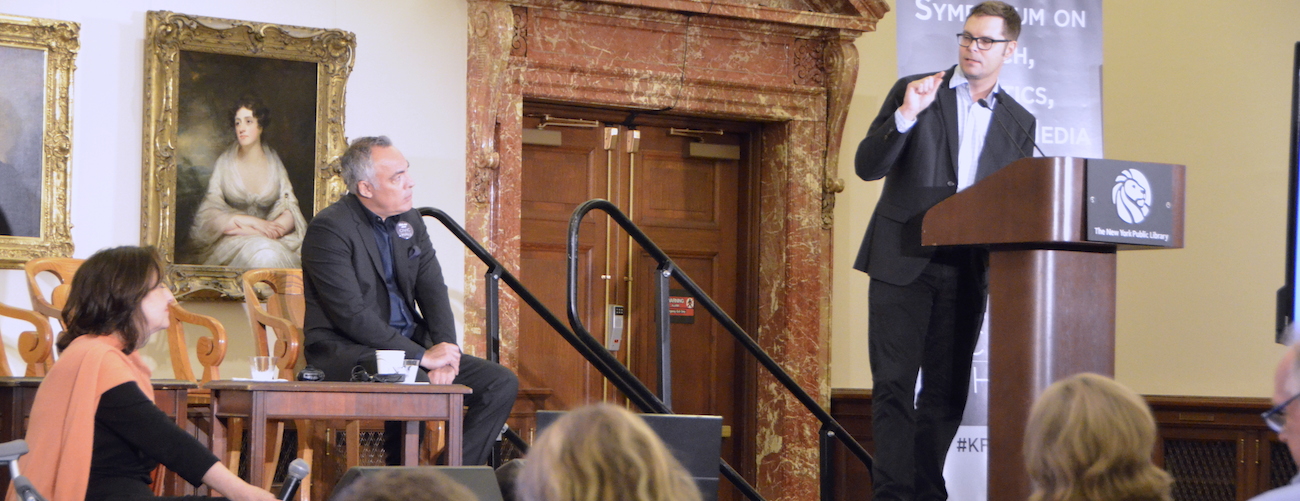Sign up for The Media Today, CJR’s daily newsletter.
Media thought-leaders and front-line journalists continue to prepare for challenges that lie ahead under the new Trump administration. We picked up five key pieces of insight on facing those challenges at a post-election symposium on tech, politics, and the media this week sponsored by The Knight Foundation and Civic Hall, an organization devoted to increasing civic engagement through new technologies. Here they are:
1. Debunk Trump’s tweets with reporting, not ridicule.
“My impression is that newsrooms oftentimes have the facts, know the truth, [but] don’t always forcibly, quickly, clearly report it out,” said Brian Stelter of CNN’s Reliable Sources. “Trump will Tweet something. We dismiss it. We tweet about it snarkily. People make fun of it, opinion columnists make fun of it, journalists quickly annotate it and move on. That’s not enough. To his supporters, his tweets are the news. Trump said the Today Show is doing badly. If there’s one thing I know about, it’s morning-show ratings. (Stelter wrote the book Top of the Morning). I didn’t just tweet about it, I wrote an entire story about it. Is that 30 minutes that could be better used another way? Possibly, but we have to verify and debunk his content. We need links to throw back, to share, to provide to the audience that does want to know.”
2. Journalists don’t earn trust simply by being truthful.
“I think the conversations that journalists have about trust and the conversation that most people have about trust are almost completely different conversations where the word doesn’t mean the same thing,” said Eli Pariser, the chief executive of Upworthy who is known for coining the phrase ‘filter bubble.’ “The thought experiment I run is: Imagine someone in your life who has your back and really wants to take care of you and is sometimes right and sometimes wrong, versus someone who is always correct, but self-centered. Which of those people do you trust more as a person? I think there’s a clear answer when you look at human psychology: We trust people who have our interests at heart. We don’t trust people on the basis of their being correct factually.”
3. The news industry needs more data-literate political reporters.
“How can we communicate to normal people, who are not statistics experts, the validity and uncertainties in polling in a much more visceral and accurate way?” asked Sally Buzbee, executive editor of the Associated Press. “Does every political reporter understand what a dangerous weapon polling is? No,” she said, adding, “When I go out and talk to journalism schools, I say, ‘Please, please, please, please, we need people who understand numbers and serious, grounded, academic statistics.’”
4. National news organizations aren’t enough to hold local politicians to account.
“There’s one person that’s more powerful than a lobbyist, and that is a journalist with an uncomfortable fact and a cellphone number. Your cellphone number,” said Sam Blakeslee, a former California state senator. “Time and again what we would find is that I would be in a committee and I would get a text from someone in my office saying, ‘Reporter A is calling about subject B. We need you back here right now.’ We didn’t have that reaction when the LA Times had a question, or the San Francisco Chronicle, or the Sacramento Bee. But when we knew reporters were calling on a sensitive subject in our district, everything changed. We went into war-room mode because we understood that once a story locally hit the front page, it would change our behaviors.”
5. Incursions on press freedom will be subtle, not dramatic.
“We ‘avoid these ends by avoiding these beginnings,’” said Jameel Jaffer of of the Knight First Amendment Institute, quoting a line from a 1942 opinion written by Supreme Court Justice Robert H. Jackson. “I think you have to see that first incremental step, not just for what it is in itself, but for what it could become. In order to do that you have to be in the right mindset. You have to understand what this administration has proposed to do over time, what its larger goals are, what its larger philosophy is. And you have to understand these seemingly incremental policy changes (such as the possibility of evicting the press corps from the White House) in that broader context.”
Has America ever needed a media defender more than now? Help us by joining CJR today.



